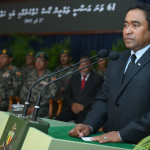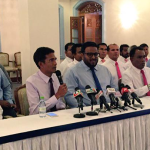This story was first published on Maldives resort review site, Dhonisaurus.com.
The Maldives government has announced its intention to unveil the country’s fourth official tourism master plan on September 27 to coincide with this year’s World Tourism Day, according to local media reports.
Tourism Minister Ahmed Adheeb last week declared that the final draft of the master plan would be unveiled by the president of the World Tourism Organisation (UNWTO) during a visit next month.
Adheeb said the five year scope of the plan was expected to emphasise strengthening tourism infrastructure across the country, while also implementing zones outlining specific types of development.
Existing aims outlined under previous master plans that were yet to be fully realised would also be included in the new document, the minister told local media.
Anticipated focus
Speaking previously to Minivan News, former Deputy Tourism Minister Mohamed Maleeh Jamal has said the master plan was anticipated to include developments such as the expansion of biospheres and other “value-adding” concepts.
“We are working on the fourth tourism master plan in line with groups like the United Nations Development Programme (UNDP) and the World Bank to focus on a destination strategy,” he said late last year.
The former deputy minister – dismissed by the government in June after deciding to back a rival candidate to President Dr Mohamed Waheed in the upcoming election – had spoken in recent months of a number of key aims to be included in the plan, including event tourism and strengthening the fledgling guest house sector.
The potential for expanding mid-market tourism in the Maldives through the “niche” guesthouse segment emerged as an early election issue this year after senior opposition and government figures clashed over how best the country’s inhabited islands might profit from visitors.
While unable to outline the exact scope of the new master plan, Maleeh also previously pointed to President Waheed’s announcement to make the Maldives the world’s largest marine reserve within the next five years as a commitment that could prove particularly beneficial to tourism.
“Since the foundation of tourism 40 years ago, the environment has always been hugely important to the Maldives. After 40 years the country is still pristine making us very popular with tourists and we welcome any actions to encourage maintaining this,” he said.
Maleeh added that the foundation of marine parks and reserves in the country at destinations like Baa Atoll was already helping create a “premium destination within a destination”, adding further value to properties located in an area of strong natural interest.
Along with the potential benefits of operating as a marine reserve, he claimed that the country’s status of being a protected marine reserve would not itself impact on the type of tourism developments being sought in the Maldives.
These plans have included ambitious proposals such as the construction of five man-made islands to support leisure developments including a 19-hole golf course in the Maldives.
Maleeh claimed that he did not think these type of projects would be threatened by the Maldives protected reserve status, with developers still being required to work within existing environmental laws that impose several restrictions on the amount of development possible on each island.
The government meanwhile announced earlier this year that it would be moving ahead with plans to transform the Maldives into a biosphere reserve through the designation of zones across the country that would earmark land use for specific purposes such as tourism development or conservation.
Despite these commitments, the country’s first Marine National Park (MNP) in Noonu Atoll is yet to receive land that successive governments have agreed would be set aside for the project back in 2011.





No disagreement here, it would a good sustainable environment policy as well as a great market development one.
The Maldives has always been a marine park . Event tourism has been here for a long time, in Bandos and Kurumba. The Saarc Summit in Addu was a major event.
Adheeb has the right perspective. Develop the infrastructure on which the industry operates. The cart and the horse must go together if Maldives is to avoid the infrastructure problems now being faced by resorts outside the seaplane belt
Not to forget the 24?hours beneath the rainbow sea event. Got to be original to make a mark. The underwater cabinet meeting was a superb triumph !
Anni was doing all this 3 years ago!!!
Under water cabinet was a disaster and it gave the wring message to Investors.
Anni environmental policies only benefited him and not to the nation.
Anni thought he can become the champion of environment at the cost of our nation.
tell me any good had happened with this kind of stunts that he had done.
Why the Maldives need a 19-hole golf course? Normal is 18!
@kuribee hate to agree with the rest of the idiots here on minivan but, our environment is Gods gift to us and our responsibility and for us to not be wasteful and damaging towards it is our responsibility, Nasheed as horrible as he is/was this was hard to disagree with
For decades the Maldives tourism was designed to cater for tourists who flocked to Maldives for its diving paradise and for those who needed a peace of mind to relax, stress free and enjoy an atmosphere of sheer relation.
Well, that market which was mainly European seizes to exist today when most European countries are undergoing recession and economical difficulties that most average travelers cannot afford such am expensive destination like the Maldives.
What we have today is a middle Asian market that is not attracted to water sports, diving and an atmosphere so ghostly that an island seems a grave yard full of silent souls. Our competitors such as Sri lanka, Seychelles, Mauritius, Thailand, Indonesia are far away a head of us offering more than just a spa resort.
Kuredhu, Meeru, Robinson, Reethibeach, Rangali are among a few who have sustained a concept that is attractive, profitable and which makes both tourists and staff happy. These resorts do so well throughout the year whilst most lag behind with their excessive room rates, jail kind of atmosphere and an attitude that is ancient.
We don't need ideas that will cost us so much yet we are broke. We need to market the Maldives as an affordable destination, entertaining, and where guests can enjoy, have fun, and interact with locals. As long as major resort owners operate individually keep fighting themselves in politics...there is no hope for improvement.
Maldives must speak as one voice not as Champa, Universal, Villa, Suntravel, sunland, etc. This division must be stopped to allow collective ideas. Little do we know that the above companies have invested heavily in tourism in other parts of the world leaving Maldives to enjoy the last minute remnant markets as we see today.
Champa resorts have been so successful, why is it and why is no one giving credit?
Did anybody notice that the so called master plan have cute ratios for local workers employment? 40% now, 50% five years from now... cute percentages when we have one in 4 in work age people unemployed?
These masterplans are just copy paste documents from somewhere else; that's why they don't reflect reality.
The champas have enough money to buy themselves all the recognition they want. There must be reasons why they don't. Perhaps their bankers and touroperators recognise their genius. And for some, that may be enough. Unless one is in politics, ofcourse.
And , collective thinking has been done to death. Didn't work.
Anni's hunaru ?? programme was an excellent idea. Not enough time for it to work, though, despite the investment. Maldivians need focused specialist training for well-paying jobs in the tourism sector. The supply is way below demand for these jobs, in the resorts and the support industries.